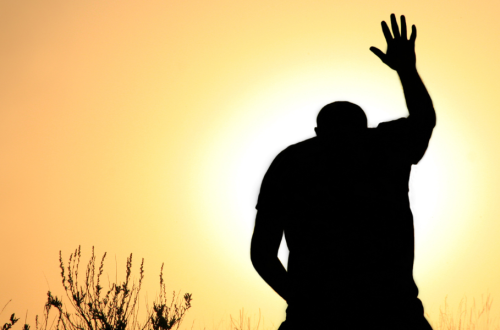
Christian Self Care part one: Lessons from under a Broom Tree
I am a child of the 1980s, a decade of denial in the church when it came to stress, fatigue, and caring for one’s self. We were told to reach the world at any cost. I remember a Bible study that suggested training oneself to live on five hours of sleep a night, because there was so much to do and so little time to do it. (This was the Cold War, when we expected the world to end every day, so we felt a little urgency, I guess.) Stopping to care for one’s needs simply wasn’t done.
Fast forward a few decades, and the new thing is self care. You hear the term everywhere, and it’s easy to wonder if this is a good idea. As a Christian, should I ever put myself first? As an anxious Christian, is it a cop-out to cater to my weaknesses, not to rely fully on God and to sacrifice everything for Him? Is self care just selfishness? Is there such a thing as Christian self care?
When self care isn’t about self
I think what gets us is the terminology. If we called it ministry prep, we might not have a problem with it. Sure, it can be abused, but maybe the Bible points to self care as a helpful, God-ordained thing. Because, as David said, dead people don’t serve God from Sheol. There are certain requirements to keep us alive and healthy enough to do God’s work, and that’s really what Christian self care is all about, having the resources and energy and health required to do what God asks us to do.
I plan to post some articles in the future about some specific areas of care, but for now I want to focus on one passage in the Bible and see what God says about self care.
The tale of a very worn out man
One of my favorite passages is Elijah under the broom tree (1 Kings 19). This man has just seen victory. He faced down prophets of Baal and called fire from heaven. How does the story end? The bad guys threaten his life, and he runs to the desert, hides under a broom tree, and asks to die.
I think it’s safe to say this is some serious burnout. His nerves have had it. He’s tired of the fight. Even seeing a huge victory didn’t restore him. He also thinks he is alone. Yes, he saw a victory, but he believes he is the only person in the world fighting God’s fights, and he hasn’t any more energy to give.
I love God’s response to Elijah. First, God feeds and waters him–Elijah wakes up to find an angel has delivered cake and water. Brings back some Psalm 23 thoughts, doesn’t it? His physical needs are filled first. Then he’s told to rest.
Most of us don’t wake up from a nap after an exhausting day and find an angel with cake in hand. No, we can care for these needs ourselves.
This doesn’t only happen once. When he rises again, he is told to eat again, for, the angel says, “the journey is too much for you.” God realizes we are humans with limits, and He doesn’t ask us to do things that we cannot do, not without giving us resources to do them. In this case, the job took physical strength, and God bolstered his physical body.
The small voice
After this, Elijah walks forty days to Horeb, the mountain of God. God draws Elijah close. With his physical needs met, God gets to work on his spiritual fatigue. He starts with an important question: “What are you doing here, Elijah?”
Elijah answers, and God doesn’t acknowledge anything Elijah says. This poor man is tired and fears for his life, and yet when he gives God this honest answer, God doesn’t say anything about it. Instead, he tells him to go wait for the presence of the Lord to pass by.
We then get the very well-known passage about an earthquake and fire and a small voice. God isn’t in the big, crashing things; he’s the small voice. Elijah recognizes that voice, and he moves to the edge of the cave, probably waiting to see what happens next.
The question
What happens next is that God asks the question again. Have you ever been asked a question by a teacher or parent, and when you give the wrong answer, they ask again, eyebrows raised, waiting for you to figure out the real answer? I find myself wondering if Elijah doesn’t really know why he’s here. He says what sent him here, but he doesn’t say what he expects God to do about it.
Of course, a powerful queen is gunning for him. Maybe this is simply a scream of Rescue Me. But when asked the question twice, he answers the same way both times, like he’s not thought past not dying.
God, however, seems to think Elijah is there for another reason. He’s there because God has more for him to do, and yet the man is in no shape to do that. Elijah is being prepared to go back out on the battlefield, and he needs full restoration in just about every area of his life before he can do what he needs to do. I doubt Elijah could have put that into words, not exactly, but God knew what the man truly needed.
After this God encourages Elijah and gives him a mission, finally acknowledging his fears. First, he is no longer going to be the only prophet. God hears Elijah’s plea and sends him Elisha. Second, God assures him there are people in Israel who haven’t bowed to Baal. Those people need someone to speak the words of God to them, and Elijah is that man. Elijah didn’t endanger his life for no reason. There is a a future for Israel and the people of God.

What just happened?
So what did God just do for worn-out Elijah? He gave him sustenance, rest, spiritual renewal, social relationships, and a job. It isn’t self care because God did it for him, but God gives us a pretty good idea what needs done when a warrior falls on the field. And I think it’s safe to extrapolate that a warrior doesn’t have to be half dead on the field to warrant this kind of care.
Most of us don’t have stories of waking up from a nap after an exhausting day and finding an angel with cake in hand. No, we can care for these needs ourselves. But we have to remember the goal. Self care, like anything good, can be abused. There is always one more podcast on diet I can watch. There is one more gym I can join. Self care has no real end, because for many it is an end in itself. It’s a way of life and not a means to something better.
The purpose of Christian self care
As Christians, the objective of self care is to get back on the battlefield—or to keep us safe on the battlefield—and do what God wants us to do. It’s preparation, not the end goal. I am not working to be my best self just to do it. I am to be my best self so I can give God my best job at whatever He wants me to do.
It’s ministry prep, which is why the list below includes a few things that aren’t on all self care lists. This is different from selfishness, where the goal is to raise my status or to impress people or to reach ever and ever higher with no goal but ME. Like many aspects of life when seen through the Christian lens, we have different perspectives, goals, hopes, and dreams than the world, and how we care for ourselves will reflect those perspectives.
Caring for myself has value, and God agrees that his children’s physical, mental, emotional, and spiritual health are worth His time, so that means those things are worth my time, too.
What constitutes self care?
This is what I plan to tackle in the future, but what we’ve seen here, along with a few more I want to hit later, gives us the beginning of a list. Self care–or ministry prep–includes physical care, spiritual care, mental/emotional care, and social care. A few specifics are below:
- Rest
- Decent food
- Work to do
- A healthy walk with God
- Social connections
- Rhythms–activity, rest. People time, alone time, God time. Etc.
- Gratitude
- Emotional maturity–learning to accept failure, betrayal, all that fun stuff that capsizes us.
- Reasonable time management
What about anxiety?
I haven’t specifically mentioned anxiety here. Elijah ended up under that tree because of fear. It was pretty much a panic attack in response to a hugely exhausting event. Everything God did, all that restoration, had an effect on that fear. When Elijah left God’s presence to look for Elisha, the fear had been wrestled down. I think caring for all aspects of our life will do the same for us, help us to wrestle anxiety to a place where we can serve.
Anxiety might never disappear for some of us, but we can still do what God wants. He knows our weaknesses and will find a way to get us through, be it an angel with a cake or an anti-anxiety pill or a good friend or a little blog post. We don’t get to sit on the sidelines. Instead, we let God give us resources to accomplish His purposes. Self care is one of those resources. (Rebekah Lyons wrote a book on anxiety called Rhythms of Renewal that is, without actually using the term, all about Christian self care for the anxious soul. I recommend it.)
If all these aspects of life matter to God—physical, social, spiritual, mental/emotional—they can matter to me, too. And I cannot lose sight of the fact that it’s not all about me. It’s all about me being able to serve as best I can. In those terms, self care is a spiritual endeavor, part of discipleship that lets me fulfill God’s purposes for my life.
In this post I tried to answer the question of should Christians practice self care. And I think the answer is yes, with the right motives, self care is vital. Next time around we’re going to look at Jesus’ life for some specific ideas on what self care looks like in the Christian life.




